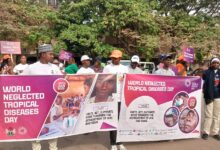World Cancer Day: WHO Urges More Investment, Quality Care

The World Health Organisation (WHO) has called on governments, especially those in the African region to make necessary investments required to ensure that all citizens, no matter their incomes or geographic location, have access to quality cancer care.
WHO Regional Director for Africa, Dr. Matshidiso Moeti made the call in her message commemorating this year’s World Cancer Day.
TheFact Nigeria gathered that World Cancer Day is commemorated on the 4th of February every year to raise global awareness around cancer and its impacts on peoples lives.
Dr. Moeti stated that Africa recorded around 1.1 million new cases of cancer, resulting in up to 700 000 deaths annually. She added that breast cancer, along with cervical, prostate, liver and colorectal cancers, accounted for almost half the new cases on the continent every year.
Sadly, children in developing were also inequitably impacted, Moeti noted:
“Of the more than 400 000 children diagnosed annually with cancer around the world, about 90% live in low- and middle-income countries. Survival rates are at a very low 20% or less in African countries, compared to more than 80% in developed countries”, she said.
Highlighting some challenges faced in the fight against cancer on the continent, the WHO regional director said:
“Common challenges across the Region include lack of awareness and education, limited access to primary prevention and early detection services, coupled with delays in diagnosis and treatment. There is also limited access to palliative care and pain relief.
“Shortages of specialists in medical and radiation oncology, pathology, medical physics and other essential areas compound the gaps.
“Africa has only 3% of the world’s cancer treatment facilities, with radiotherapy available in just 22 countries in sub-Saharan Africa, which contributes to poor survival rates”, she lamented.
Moeti therefore posited that a renewed effort to curb new cancer cases was urgent; especially as there had been alarming projections that cancer death rates in Africa wold rise exponentially over the next 20 years, outstripping the global average by 30%.
Disclosing some of the intervention efforts embarked on, the WHO Boss said:
“These have seen 45% of our countries introduce national HPV vaccination programmes to address the cervical cancer threat. National screening programmes are now operational in 72% countries, 11 of which offer high-performance screening.
“Through the Global Initiative for Childhood Cancer (GICC), Zambia, Senegal and Ghana have developed country-specific treatment guidelines, established pediatric hospital-based registries, and improved access to chemotherapy. Senegal is in the process of including childhood cancers in its new National Cancer Control Plan”, Moeti said.
She further advised that as countries worked towards universal health care, with the support of WHO, cancer risk factors needed to be prioritised abd that equitable access to life-saving vaccines, robust screening and early detection programmes, combined with a skilled workforce, adequate infrastructure and equipment, was also critical.
She therefore solicited individuals, governments, partners and civil societies to make effort to achieve uninterrupted access to affordable, safe and effective cancer therapies for all patients.
This year’s World Cancer Day theme, ‘’Close the care gap”, marks the start of a three-year campaign to raise global awareness around cancer and its impacts, especially on the most vulnerable citizens.






